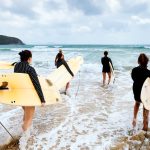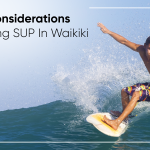Embarking on the journey of surfing can be a thrilling experience. As one of the most popular water sports, it brings together the serenity of floating on water and the adrenaline rush of surfing. However, before diving into the deep end, it is essential to get some foundational surfing lessons. As with most sports, having proper instruction can not only enhance your experience but also ensure safety. The primary question most beginners face is whether to opt for private lessons or go for group sessions. In this article, we will explore the benefits and drawbacks of both to help you make an informed decision.
Understanding Private Surfing Lessons
- Personalized Attention: The biggest advantage of private surfing lessons is the undivided attention you receive from the instructor. This ensures that all your mistakes are immediately corrected, and the lessons can be tailored to your specific needs and pace.
- Rapid Progression: With one-on-one instruction, you are likely to grasp techniques and improve faster. There is no waiting for others or feeling held back by a group’s collective pace.
- Cost Factor: One major drawback of private lessons is the cost. They tend to be more expensive than group sessions because of the individual attention you receive.
Exploring Group Surfing Lessons
- Social Interaction: Group lessons offer a great opportunity to meet new people who share your interest in surfing. This can lead to forming new friendships and enjoying a communal learning experience.
- Competitive Spirit: Seeing others at the same learning stage as you can instill a sense of healthy competition. It might motivate you to push your boundaries and achieve more.
- Diverse Learning: In a group setting, you can learn not just from the instructor, but also from the mistakes and successes of others. This provides a holistic learning experience.
- Cost-Effective: Group lessons are generally more affordable than private sessions. This makes it a preferred choice for many who are just testing the waters and do not want to invest heavily right away.
Factors to Consider When Making Your Decision
- Learning Style: Are you someone who prefers individual attention? Or do you thrive in group environments? Your personal learning style can play a significant role in determining the best lesson format for you.
- Budget: While passion for the sport is vital, it is also essential to consider the financial aspect. Determine your budget and see which type of lesson aligns with it.
- Purpose: If you are looking to turn professional or compete in surfing events, then private lessons might be more beneficial. However, if you are doing it for leisure or as a hobby, group lessons could suffice.
- Frequency: How often do you plan to take lessons? If it is a one-time or infrequent experience, group lessons might be more economical and practical. On the other hand, if you intend to attend lessons regularly, focused attention in private sessions could prove invaluable.
- Location: Consider where the lessons are being held. Some locations might be best suited for one-on-one instruction due to factors like water currents, crowd density, and environmental conditions. For instance, a busy beach might not be ideal for group sessions due to distractions and space limitations.
- Feedback and Review Mechanisms: After each lesson, it is beneficial to have a feedback session. With private lessons, this is almost guaranteed as you have the instructor’s full attention. In group lessons, however, ensure there is a mechanism for individual feedback so you know areas of improvement.
- Access to Resources: Sometimes, surfing lessons might come with additional resources such as video tutorials, manuals, or access to online forums and communities. In private lessons, you might get personalized resources tailored to your needs. In contrast, group lessons might offer generalized resources beneficial for a wider range of participants.
- Safety Protocols and Instructor Qualifications: It is essential to ensure your safety during lessons, especially in a water sport like surfing. When opting for private lessons, you can easily vet the instructor’s qualifications and discuss safety protocols in detail. On the other hand, group lessons, due to their size, might follow standardized safety measures. It is essential to inquire about the instructor’s certifications, experience, and the safety measures in place for both individual and group scenarios. An instructor with recognized certifications and a clear safety plan will provide peace of mind, regardless of the lesson type you choose.
Enhancing Skill Development Beyond the Basics
When you have decided between private and group lessons, there is more to consider than just the foundational techniques.
- Advanced Techniques: As you progress, you will want to learn advanced maneuvers. Private lessons might offer a faster progression into these techniques due to the personalized nature of instruction.
- Exploration of Locations: Group lessons often take place in a set location suitable for beginners. However, private lessons might offer the flexibility to explore different locales and allow for diverse learning experiences and challenges.
- Safety Practices: Both lesson types will teach safety, but private instruction might provide deeper insights into risk assessment and handling specific challenges you might encounter, tailored to your individual needs.
- Exposure to Equipment: Surfing boards come in various designs and purposes. A private instructor can guide you toward boards that suit your skill level and aspirations. On the other hand, group sessions might use a generic board suitable for general use.
Opportunities Beyond Just Surfing
Once you are well-versed in surfing, there are other water sports and activities to explore, enhancing your water skills portfolio.
- Paddle boarding: After mastering surfing, you might want to try your hand at paddle boarding. It provides a different challenge, emphasizing balance and wave reading.
- Bodyboarding: This offers a fun way to experience waves without the complexities of standing up. It is a unique experience and offers its own set of thrills.
- Rentals and Equipment Exploration: Before investing in equipment, explore options like surfboard rental or bodyboard rentals. This allows you to test various equipment types and find what suits you best.
Before investing in equipment, explore options like surfboard rental or bodyboard rentals. This allows you to test various equipment types and find what suits you best.
Surfing can be as serene or as challenging as you want it to be, but ensuring that you receive the right training is vital for a safe and fulfilling experience. By weighing the various factors detailed above, you can confidently choose the lesson structure that aligns best with your needs. As you embark on this journey, embrace every wave, every learning curve, and the joy of standing tall on the water.




